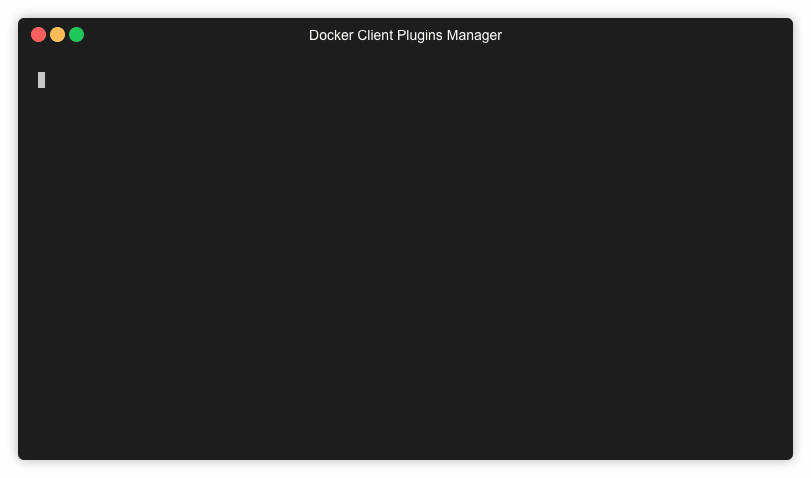Docker Client Plugins Manager (CLIP) is a Docker client plugin allowing to create, build new Docker client plugins in any programming language, publish them on Docker Hub or just try some plugins from the catalog and install them locally. Project is written entirely in Bash.
Plugins are distributed as Docker images and can be published on Docker Hub, they are built from "scratch" so the image size reflects the plugin binary size. Example plugins from this repository are written in Bash so the plugin images are tiny (500 bytes - 2 KB).
Start with downloading the CLIP Docker plugin:
curl -sf https://raw.githubusercontent.com/lukaszlach/clip/master/docker-clip -o ~/.docker/cli-plugins/docker-clip
chmod +x ~/.docker/cli-plugins/docker-clipIt should be automatically detected by the Docker client:
$ docker info | grep clip
clip: Docker Client Plugins Manager (Łukasz Lach, v19.06.0)
$ docker clip --helpThere are a lot of ready plugins available in this repository and already published on Docker Hub. Search through the remote plugin catalog using docker clip search command.
You can install them with a single docker clip add command. If you do not like one of the plugins you can remove it using the docker clip rm command.
- expose - Expose your container on the Internet, anytime, for any time (see how it works)
- publish - Publish a port on a running container
- showcontext - Display contents of the build context (see how it works)
- microscan - Scan the image with Aqua Microscanner
- dive - Explore contents of the image layers (see how it works)
- runlike - Get the command line necessary to run a copy of any container
- sh - Enter the container shell no matter if it is bash or sh
- hello - Hello World example plugin
docker clip add IMAGE:TAG
As CLIP distributes plugins as Docker images - all you need to know is the image name and tag. Call docker clip add to install any plugin locally, the image will be pulled from the registry if needed.
$ docker clip add lukaszlach/clips:expose
Installing client plugin from lukaszlach/clips:expose
Successfully installed lukaszlach/clips:expose client plugin
New client command available: 'docker expose'
$ docker expose --helpdocker clip rm COMMAND
You can uninstall the plugin with the docker clip rm command:
$ docker clip rm expose
Successfully removed 'expose' client commanddocker clip ls
The command lists all additional Docker client plugins installed and maintained by CLIP:
$ docker clip ls
COMMAND IMAGE
microscan lukaszlach/clips:microscandocker clip search [PATTERN]
Search the remote plugin catalog:
$ docker clip search security
COMMAND IMAGE DESCRIPTION
microscan lukaszlach/clips:microscan Scan the security of an image with Aqua MicroscannerSpecifying a pattern is optional, the command will list all plugins if it is not passed:
$ docker clip search
COMMAND IMAGE DESCRIPTION
dive lukaszlach/clips:dive Explore contents of the image layers
expose lukaszlach/clips:expose Expose container HTTP port on the Internet
hello lukaszlach/clips:hello Hello World
...docker clip build -c COMMAND -t IMAGE:TAG CONTEXT
docker clip push IMAGE:TAG
In order to build a new plugin you need to create a build context directory which must contain two files. Assuming you are developing the hello command (see the example implementation in this repository):
docker-hello- the plugin executable, can be a binary or a shell scriptdocker-hello.json- the plugin manifest in JSON format
The manifest file is used by Docker Client to fetch details about the plugin and to ensure it is supported.
SchemaVersionneeds to be set to0.1.0Vendor,VersionandShortDescriptioncan take any string value, they are visible in the output ofdockeranddocker infocommands
{
"SchemaVersion": "0.1.0",
"Vendor": "Łukasz Lach",
"Version": "v1.0",
"ShortDescription": "Hello World"
}The script stored in docker-hello can be as simple as:
#!/bin/sh
echo Hello WorldAny other files present in the build context directory will be added along with the binary and manifest, your plugin can use and depend on these files to be present on the client disk after installation.
After you are ready with the plugin code, build the plugin image with the docker clip build command:
$ docker clip build -c hello -t lukaszlach/clips:hello .
Building lukaszlach/clips:hello client plugin
sha256:8d53da12e07fe6d0ae9f129311de985361718f6903583113082042f96ca95be3
Successfully built lukaszlach/clips:hello client pluginPass the command name in -c parameter and an image tag in -t, the last parameter is a build context. The command works similarly to docker build and actually uses it underneath to build the image.
You can now test the plugin locally by simply installing it or push it to the registry with the docker clip push command:
$ docker clip push lukaszlach/clips:helloMIT License
Copyright (c) 2019 Łukasz Lach llach@llach.pl
Permission is hereby granted, free of charge, to any person obtaining a copy of this software and associated documentation files (the "Software"), to deal in the Software without restriction, including without limitation the rights to use, copy, modify, merge, publish, distribute, sublicense, and/or sell copies of the Software, and to permit persons to whom the Software is furnished to do so, subject to the following conditions:
The above copyright notice and this permission notice shall be included in all copies or substantial portions of the Software.
THE SOFTWARE IS PROVIDED "AS IS", WITHOUT WARRANTY OF ANY KIND, EXPRESS OR IMPLIED, INCLUDING BUT NOT LIMITED TO THE WARRANTIES OF MERCHANTABILITY, FITNESS FOR A PARTICULAR PURPOSE AND NONINFRINGEMENT. IN NO EVENT SHALL THE AUTHORS OR COPYRIGHT HOLDERS BE LIABLE FOR ANY CLAIM, DAMAGES OR OTHER LIABILITY, WHETHER IN AN ACTION OF CONTRACT, TORT OR OTHERWISE, ARISING FROM, OUT OF OR IN CONNECTION WITH THE SOFTWARE OR THE USE OR OTHER DEALINGS IN THE SOFTWARE.









